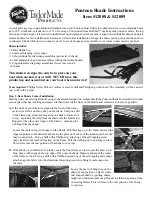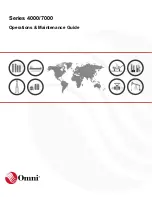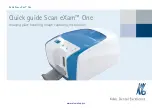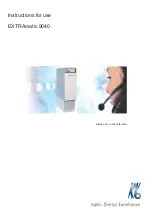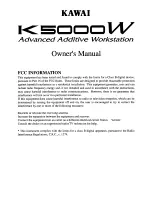
15 - 12
BeneVision N1 Patient Monitor Operator’s Manual
4.
Select the
Main Menu
quick key
→
from the
System
column select
Maintenance
→
input the required
password
→
select .
5.
Select the
Module
tab
→
CO2
tab.
6.
Check that the current flow rate is less than 10ml/min, and the alarm message “
CO2 Airway Occluded
”
does not disappear.
This indicates that the module does not leak. If the alarm message disappears, or the flow rate is equal to
10ml/min or greater, it indicates that the module leaks. Perform the leakage test again. If the problem
remains, contact your service personnel for help.
15.14
CO
2
Calibration
For sidestream and microstream CO
2
modules, a calibration is needed every year or when the measured values
have a great deviation. For maintream CO
2
module, no calibration is needed. To calibrate the CO
2
module,
contact the service personnel.
CAUTION
•
Connect the gas outlet to the scavenging system when calibrating the CO
2
module.
15.15
Test Method Used to Determine the Respiration Rate Measuring
Range
To determine the RR measurement range, follow this procedure:
1.
Connect the 5% CO2 + N2 (BAL) gas cylinder, reduction valve, rhythm generator and gas sampling path of a
monitor.
2.
Respectively set the rhythm generator to generate a respiration rate of 0 rpm, 6 rpm, 20 rpm, 60 rpm,
120rpm, and 150 rpm.
3.
Verify that it meets the specifications.
NOTE
•
The rhythm generator mentioned above is a sensor/sampling site in Figure 201.101 – Test apparatus
for the TOTAL SYSTEM RESPONE TIME of an RGM of ISO 80601-2-55.
15.16
CO
2
Troubleshooting
This section lists the problems that might occur. If you encounter the problems when using the equipment or
accessories, check the table below before requesting for services. If the problem persists, contact your service
personnel.
NOTE
•
For the physiological and technical alarm messages, see
.
15.16.1
Troubleshooting the Sidestream/Microstream CO
2
Module
Problem
Solution
EtCO
2
measurements too low
1. Ventilate the room if the environmental CO
2
concentration is too
high.
2. Check the sample line and connectors for leakage.
3. Check the patient status.































